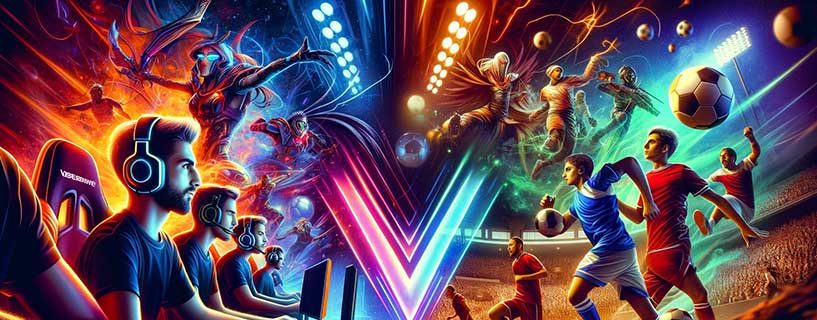The world of competitive entertainment is undergoing a remarkable shift, with the rising prominence of Esports challenging the traditional dominance of physical sports. Our interests have now been expanded thanks to advances in technology and this is where Esports were born. As we look for new forms of entertainment, this has now turned Esports and traditional sports into an ongoing battle. So, let’s look into this clash of entertainment titans, exploring their differences, similarities, and the evolving landscape of fan-based entertainment.
1. The Rise of Esports – A New Challenger Enters🏆
Esports, a relatively new contender in the world of entertainment, has rapidly gained traction. Born from gaming, Esports hosts pro gamers in tournaments featuring titles like League of Legends, Dota 2, and Counter-Strike, propelling this growing industry. This digital domain has attracted a massive global following, drawing in young audiences who connect with the fast-paced action and strategic gameplay of Esports. The rapid growth and engagement in this field have raised questions about its potential to challenge the longstanding dominance of traditional sports.
2. Traditional Sports – A History of Legacy Entertainment
 Traditional sports like football, F1, golf, basketball, and more hold a deep, global history in entertainment. The thrill of athleticism, physical prowess, and the spirit of competition form the core of traditional sports’ appeal. This is the reason why fans from around the world follow teams from other countries as well as their own. These sports have long-standing leagues, teams, and tournaments, serving as a mainstay in entertainment for generations, setting high standards for competition. The competitiveness and the enjoyment of winning is the reason why fans continue to watch these sports, day after day and year after year.
Traditional sports like football, F1, golf, basketball, and more hold a deep, global history in entertainment. The thrill of athleticism, physical prowess, and the spirit of competition form the core of traditional sports’ appeal. This is the reason why fans from around the world follow teams from other countries as well as their own. These sports have long-standing leagues, teams, and tournaments, serving as a mainstay in entertainment for generations, setting high standards for competition. The competitiveness and the enjoyment of winning is the reason why fans continue to watch these sports, day after day and year after year.
3. The Battle for Attention – Bringing Generations Together
 Esports and traditional sports differ not only in their formats but also in their approach to engaging audiences. Esports’ rise has largely resonated with younger audiences, drawn to the digital nature, gaming culture, and the quick, dynamic pace of gameplay. On the other hand, traditional sports attract a more diverse demographic, including those with an appreciation for physical prowess and the history associated with each sport. The battle for attention extends way beyond age groups, showcasing a clash of cultures and preferences. Esports, with its digital foundation, taps into the tech-savvy and gaming-centric audience, while traditional sports hold a legacy that appeals to those with a taste for physicality and history.
Esports and traditional sports differ not only in their formats but also in their approach to engaging audiences. Esports’ rise has largely resonated with younger audiences, drawn to the digital nature, gaming culture, and the quick, dynamic pace of gameplay. On the other hand, traditional sports attract a more diverse demographic, including those with an appreciation for physical prowess and the history associated with each sport. The battle for attention extends way beyond age groups, showcasing a clash of cultures and preferences. Esports, with its digital foundation, taps into the tech-savvy and gaming-centric audience, while traditional sports hold a legacy that appeals to those with a taste for physicality and history.
4. Evolving Platforms – The Shift in Viewing Experience
 One of the key distinctions between Esports and traditional sports lies in the platforms they leverage. Esports often find their home on online streaming platforms like Twitch, YouTube Gaming, and specific gaming-focused channels. The ability to stream tournaments and matches in real-time has democratized access, allowing fans to engage directly with the gameplay and their favourite players. Conversely, traditional sports have a stronghold in television broadcasting, with major networks airing matches, events, and championships. The immersive experience of being present at stadiums or arenas contributes to the traditional sports atmosphere, offering a sense of camaraderie among fans.
One of the key distinctions between Esports and traditional sports lies in the platforms they leverage. Esports often find their home on online streaming platforms like Twitch, YouTube Gaming, and specific gaming-focused channels. The ability to stream tournaments and matches in real-time has democratized access, allowing fans to engage directly with the gameplay and their favourite players. Conversely, traditional sports have a stronghold in television broadcasting, with major networks airing matches, events, and championships. The immersive experience of being present at stadiums or arenas contributes to the traditional sports atmosphere, offering a sense of camaraderie among fans.
5. Economic Influence – The Business Behind the Battles
 The economic impact of both sectors reflects the intense battle for supremacy in the entertainment industry. Esports’ growth in sponsorships, advertising, and media rights is rapidly catching up with traditional sports. Esports investment is surging as brands seek to explore this growing market’s potential. Traditional sports, with their established infrastructure and long-standing relationships with sponsors, continue to draw significant revenues. However, the potential for Esports to challenge this economic stronghold cannot be underestimated, given its rapidly increasing market appeal and potential for diverse revenue streams.
The economic impact of both sectors reflects the intense battle for supremacy in the entertainment industry. Esports’ growth in sponsorships, advertising, and media rights is rapidly catching up with traditional sports. Esports investment is surging as brands seek to explore this growing market’s potential. Traditional sports, with their established infrastructure and long-standing relationships with sponsors, continue to draw significant revenues. However, the potential for Esports to challenge this economic stronghold cannot be underestimated, given its rapidly increasing market appeal and potential for diverse revenue streams.
An Evolving World of Entertainment
The clash between Esports and traditional sports is not just about pitting two forms of entertainment against each other; it’s a clash of cultures, technologies, and generational preferences. Esports’ rapid rise challenges the conventional notions of fan-based entertainment, presenting a dynamic alternative that is engaging the younger generations, streaming towards the PowerPlay home page to use their interest to generate some extra dough. The battle for the future of fan-based entertainment isn’t necessarily about one form dominating the other; it’s about both coexisting and complementing each other in the evolving landscape of entertainment. The future might see a fusion of elements from both worlds, creating a diverse and inclusive entertainment space that caters to a wide range of preferences and interests. As technology and cultures evolve, the coexistence of Esports and traditional sports might create entertainment that appeals to a broad spectrum of audiences, marking a new chapter in the world of competitive engagement.


 by Symphonie
by Symphonie